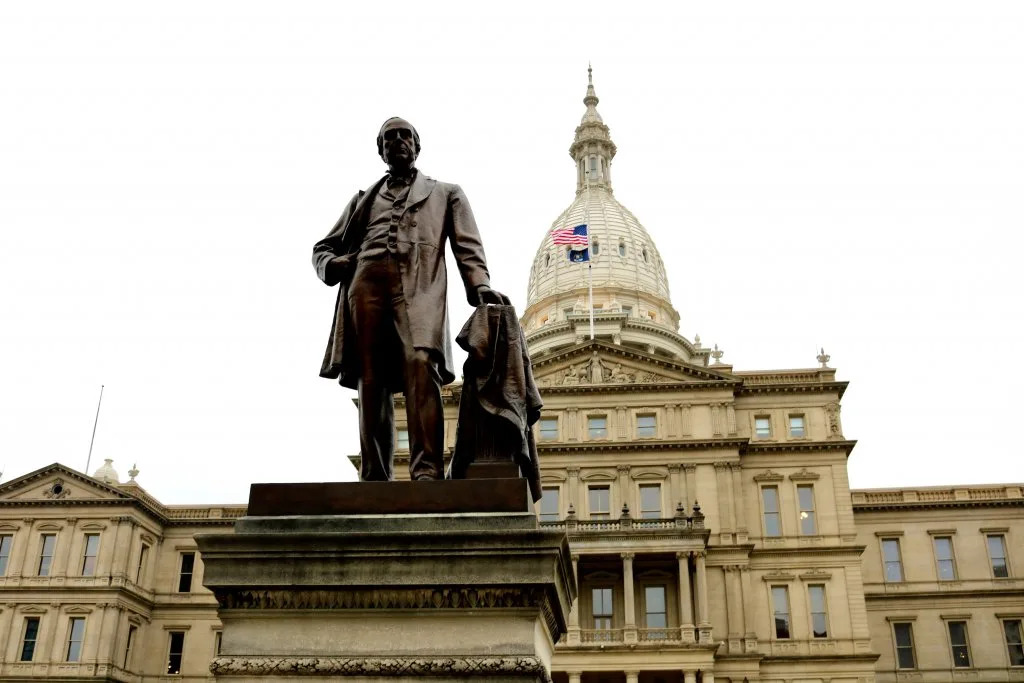
Michigan Capitol | Susan J. Demas
Every 16 years, Michigan voters are asked whether the state should hold a Constitutional Convention, where a group of delegates will work together to overhaul the state constitution.
While the mechanism for calling a convention, informally known as a “Con-Con” was written into the Michigan Constitution approved in 1963, the state has yet to call for another convention, with a strong majority of voters rejecting the proposal in 1978, 1994 and 2010.
With 2026 marking yet another year with a Con-Con proposal on the ballot, opponents from both sides of the aisle are gearing up to speak out against revamping the state constitution, warning the process could fall victim to political extremists.
On Friday members of Protect MI Constitution from Special Interests filed paperwork to form a ballot question committee to advocate against the Con-Con question, which will appear as Proposal 1 on the ballot.
According to the group’s website, its members include individuals from both parties, including small business owners, skilled trades workers, nurses, teachers, police officers and firefighters.
A statement from the group warns that a Con-Con would cost tens of millions of taxpayer dollars, diverting funds away from programs that benefit Michigan residents.
During the 2025 Mackinac Policy Conference Michigan House Speaker Matt Hall (R-Richland Township) and Senate Minority Leader Aric Nesbitt (R-Porter Township) backed the effort to call a Con-Con.
While Hall viewed it as an avenue to remove provisions from the state constitution that he said sounded good on paper but had raised frustrations with voters, Nesbitt viewed it as an opportunity to make updates to the document that politicians in Lansing haven’t had the “political courage … to actually get done.”
SUBSCRIBE: GET THE MORNING HEADLINES DELIVERED TO YOUR INBOX
If voters do call a convention, a special primary and general election would be held for delegates, with one delegate elected for each of the state’s 110 House districts and 35 Senate districts. The convention would come together in October 2027 and would work to rewrite the state’s constitution with no time limit to propose a new document. Voters would then need to approve the final document.
Among the individuals involved with the opposition effort are Jeff Timmer, the campaign director for the anti-Donald Trump Lincoln Project and a former executive director of the Michigan Republican Party and Dianne Byrum, a founding partner of Byrum & Fisk Advocacy Communications and a former Democratic state lawmaker who served as Michigan House minority leader while Republicans held the majority.
“Voting no on Proposal 1 protects Michiganders from tax hikes and ensures politicians don’t get to draw the maps of their own districts, among other things,” Timmer said in a statement. “Voters have already spoken on these and other important changes over the decades. We can’t allow extreme special interest groups to get their hands on our constitution. Michigan’s Constitution already has an effective, proven and fair process to make changes and it shouldn’t be upended by a partisan Con-Con, especially in this highly divisive political moment.”
Under the current system, Michigan voters can initiate a Constitutional amendment through a petition drive. In order to have the matter placed before all voters in the state, petitioners must gather signatures from registered voters equal to 10% of the votes cast for governor in the previous gubernatorial election.
“The Michigan Constitution has served us well for over 60 years, and it works,” Byrum said. “Many citizens and organizations realize the dangers of a Con-Con and they are joining our effort to advocate for a no vote on Proposal 1. Together, we will stand up to efforts by wealthy partisan donors and special interest groups to rewrite Michigan’s Constitution to promote their extreme agendas.”








Comments